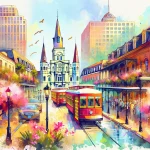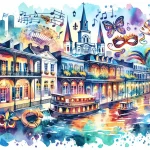Situated in the renowned French Quarter, the New Orleans Historic Voodoo Museum stands as a testament to the city’s captivating Voodoo heritage. This small but engaging museum has been preserving and showcasing the history, artifacts, and traditions of New Orleans Voodoo since 1972.
In This Article
TL;DR
- Voodoo has played a vital role in shaping New Orleans’ cultural identity since the early 1700s.
- The museum houses an authentic collection of Voodoo artifacts, including antique dolls, talismans, and personal belongings of renowned practitioners.
- Through educational tours, workshops, and lectures, the museum aims to foster a deeper understanding of Voodoo’s influence on the city.
The History of Voodoo in New Orleans
Voodoo, a spiritual practice rooted in West African traditions, arrived in New Orleans through the transatlantic slave trade in the early 18th century. As enslaved Africans were forced to adopt Catholicism, they blended their ancestral beliefs with the imposed religion, giving rise to the unique form of Voodoo practiced in New Orleans.
Throughout the city’s history, influential Voodoo practitioners, such as Marie Laveau, emerged as powerful figures in both the spiritual and social spheres. Known as the “Voodoo Queen of New Orleans,” Marie Laveau’s legendary magical abilities and her alleged role as a brothel owner contributed to her enduring fame.
Inside the Museum: A Tour of Exhibits
The New Orleans Historic Voodoo Museum is a treasure trove of fascinating exhibits that illuminate the world of Voodoo. Upon entering, visitors are greeted by an authentic Voodoo altar adorned with candles, offerings, and sacred objects. The museum’s hallway and rooms are filled with an extensive collection of artifacts, including masks, dolls, charms, and photographs.
One of the most notable exhibits is the replica of Marie Laveau’s tomb, complete with offerings and notes left by visitors seeking her blessings. The museum also showcases the kneeling bench that once belonged to the famed Voodoo priestess. Informative displays and multimedia presentations throughout the museum provide context and deepen visitors’ understanding of the exhibits.
Educational Programs and Community Engagement
The New Orleans Historic Voodoo Museum is dedicated to promoting education and cultural preservation. The museum offers guided tours led by knowledgeable staff who share insights into the history, beliefs, and practices of Voodoo. Visitors are encouraged to ask questions and engage in discussions during these tours.
In addition to tours, the museum hosts workshops and lectures that explore various aspects of Voodoo, from its African origins to its contemporary manifestations. These programs aim to foster a greater appreciation for Voodoo’s cultural significance and dispel common misconceptions surrounding the practice.
The Influence of Voodoo on New Orleans Culture
Voodoo has left an indelible mark on the cultural fabric of New Orleans. Its influence can be seen in the city’s music, art, and festivals. The annual Voodoo Music + Arts Experience, for example, celebrates the spirit of New Orleans through a fusion of music, art, and Voodoo-inspired performances.
Voodoo symbols and motifs, such as the vévé (sacred diagrams), are often incorporated into local art and crafts. The city’s cuisine also bears the imprint of Voodoo, with dishes like gumbo and jambalaya having roots in African culinary traditions brought over by enslaved individuals.
Key Figures in New Orleans Voodoo
The New Orleans Historic Voodoo Museum pays homage to the influential figures who have shaped the city’s Voodoo tradition. Marie Laveau, the most famous Voodoo Queen, is prominently featured in the museum’s exhibits. Born in 1801, Laveau gained a reputation as a powerful Voodoo practitioner and a respected member of the community. Her legacy continues to inspire and fascinate visitors to this day.
Other notable Voodoo practitioners associated with the museum include Doctor John, a 19th-century Voodoo king, and Sallie Ann Glassman, a contemporary Voodoo priestess who has been instrumental in preserving and promoting the tradition.
Visitor Experience and Engagement
Visitors to the New Orleans Historic Voodoo Museum consistently praise the museum’s immersive atmosphere and the wealth of information provided. Many appreciate the opportunity to learn about Voodoo from a respectful and authentic perspective, free from sensationalism and stereotypes.
To make the most of your visit, allocate at least 30-45 minutes to explore the museum’s exhibits. Engage with the knowledgeable staff and ask questions to deepen your understanding of Voodoo. The museum is open daily from 10 am to 6 pm, and admission is $10 for adults, with discounts available for students, seniors, military, and children.
Visitor Information:
Address: 724 Dumaine St, New Orleans, LA 70116
Hours: Open daily from 10 am to 6 pm
Admission: $10 for adults, with discounts available for students, seniors, military, and children
Website: http://voodoomuseum.com
Phone: (504) 680-0128
The Museum’s Role in Cultural Preservation
The New Orleans Historic Voodoo Museum plays a vital role in preserving the city’s Voodoo heritage. By collecting, displaying, and interpreting Voodoo artifacts and stories, the museum ensures that this important aspect of New Orleans’ history is not lost or forgotten.
The museum collaborates with cultural preservation organizations and academic institutions to further its mission. These partnerships enable the museum to share its expertise, contribute to scholarly research, and engage in broader conversations about the significance of Voodoo in American cultural history.
Future of the Museum and New Orleans Voodoo
As interest in Voodoo continues to grow, the New Orleans Historic Voodoo Museum remains committed to providing an authentic and educational experience for visitors. The museum plans to expand its collection and develop new exhibits that explore the evolving role of Voodoo in contemporary New Orleans culture.
The museum’s ongoing efforts to promote cultural preservation and community engagement ensure that the rich legacy of New Orleans Voodoo will be celebrated and sustained for generations to come.
Whether you’re a curious newcomer to Voodoo or a seasoned enthusiast, the New Orleans Historic Voodoo Museum offers a captivating journey into the heart of this fascinating tradition. By exploring the museum’s exhibits, attending its educational programs, and engaging with its knowledgeable staff, visitors can gain a deeper appreciation for the enduring impact of Voodoo on the cultural landscape of New Orleans.






